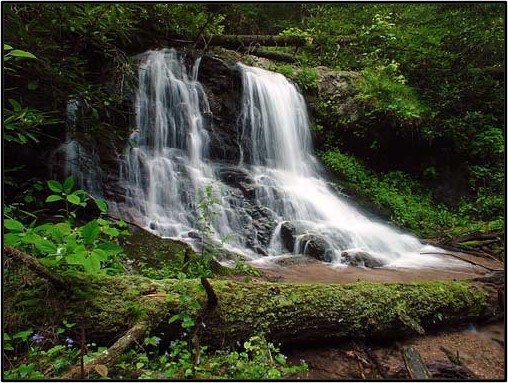By Rachita Gowdu
Stanback Fellow
Gorges State Park is one of North Carolina's most dramatic public spaces, with deep ravines, breathtaking waterfalls and lush, often rare plant life. Also dramatic is the story of how it became part of North Carolina's park system, thanks to the dedication of one of the N.C. Sierra Club's longtime leaders.
Thought of as one of the best kept secrets of the greater Appalachian region, Gorges State Park achieved state park status more than 20 years ago due to the efforts of a coalition of environmental forces, with Bill Thomas at its root.
Thomas, a chemical engineer by trade, first joined the Sierra Club in the early 1980s. He later served as chair of the N.C. Chapter as well as holding leadership positions in local Groups, while working with Dupont Co. at its plant in Cedar Mountain.
An avid hiker and outings chair for the WENOCA group in Asheville, Thomas, now 92, used to lead treks and gatherings to celebrate the beauty of the Appalachian mountains that surround this region. It was through this work that he heard about the Horsepasture River in North Carolina. After finding out that the river was being threatened by a hydroelectric project, he and his wife, Shirl, founded the Friends of the Horsepasture River. Only a few years after the start of this organization, President Reagan designated the Horsepasture a Wild and Scenic River, protecting it for the years to come.
 The Horsepasture River, part of the Lake Jocassee watershed, and the area that would become Gorges State Park are regions of immense ecological diversity, with rare and endangered species that, in some cases, aren't found anywhere else in the world. But it also looked promising to power companies eager to exploit the land and water to generate hydroelectric power.
The Horsepasture River, part of the Lake Jocassee watershed, and the area that would become Gorges State Park are regions of immense ecological diversity, with rare and endangered species that, in some cases, aren't found anywhere else in the world. But it also looked promising to power companies eager to exploit the land and water to generate hydroelectric power.
Duke Energy owned about 60,000 acres in the area, on both sides of the border between North and South Carolina.
Thomas soon became involved with more efforts to protect this lush landscape between the Pisgah and Nantahala national forests, about 60 miles southwest of Asheville. Many politicians and community residents wanted a designated state park in the western part of North Carolina, and this seemed the perfect opportunity to do so.
“The Gorges were national park beauty,” Thomas said, “and deserved to be protected as such.”
Duke Energy relented, selling part of the land on each side of the border. South Carolina took 30,000 acres, while North Carolina appropriated funds for a 10,000 parcel.
The project hit a snag as hunters objected, fearing that state park designation would mean loss of hunting grounds. Ultimately, about 3,000 acres was set aside as hunting land in the final Gorges plan.
Thomas reiterates the importance of the Chapter’s support throughout the long efforts to settle the project.
“As a large organization, the Sierra Club’s brand name is nationally recognizable and has resources across the state,” he said.
 The Chapter’s location in Raleigh allows for local volunteers to act in tandem with professional staff including the Chapter's lobbyist. This kind of cooperation is vital in implementing systemic and structural change that mitigates or stops threats to our public lands.
The Chapter’s location in Raleigh allows for local volunteers to act in tandem with professional staff including the Chapter's lobbyist. This kind of cooperation is vital in implementing systemic and structural change that mitigates or stops threats to our public lands.
As Thomas puts it, “It’s silly to protect wild areas if you are going to pollute from the outside.”
The lessons learned of cooperation, collaboration and fighting all types of environmental threats continue to resonate with the N.C. Sierra Club. And the spirit of the Gorges State Park efforts continue as well - significantly now, as we organize with our members, supporters and allied organizations to assure that environmental protection is emphasized in the U.S. Forest Service's new management plan for the Pisgah and Nantahala national forests.
We know it's our duty - and our pleasure - to save these special places and ensure that all people have equitable access to unique refuges like the Gorges, where they can find peace, enjoy a sense of wonder, and appreciate the special gifts in our natural world.